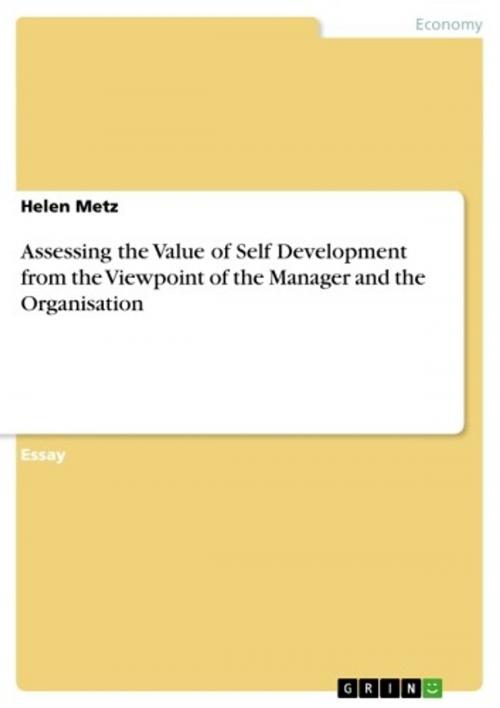Assessing the Value of Self Development from the Viewpoint of the Manager and the Organisation
Business & Finance, Management & Leadership, Management| Author: | Helen Metz | ISBN: | 9783640368990 |
| Publisher: | GRIN Publishing | Publication: | July 8, 2009 |
| Imprint: | GRIN Publishing | Language: | English |
| Author: | Helen Metz |
| ISBN: | 9783640368990 |
| Publisher: | GRIN Publishing |
| Publication: | July 8, 2009 |
| Imprint: | GRIN Publishing |
| Language: | English |
Essay from the year 2007 in the subject Business economics - Business Management, Corporate Governance, grade: A, University of Westminster, language: English, abstract: The key element of self development is that individuals take responsibility of their own learning. The learner identifies learning needs, determines the learning goal, selects the method on how to achieve it and initiates it. The role of the development specialist becomes that of a facilitator, counsellor or supporter rather than the provider or initiator of development opportunities (Pedler, 1988; Pedler et al., 2007). Self development takes into consideration that approximately 80 per cent of learning is through experience and integrates learning in the context where it happens. Self development is not only about enhancing professional skills and performance; it is also about personal growth (Boydell and Pedler, 1981; Megginson and Pedler, 1992). For self development to be beneficial to the individual as well as the organisation, supplementary activities, such as development centres, personal development plans or competency dictionaries can offer guidelines to the individual (Antonacopoulou, 2000). Self development should not be regarded as separate to organisational development, but rather as an integral component (Smith, 1990). Self development ought to be '[...] a developmental strategy which is beneficial both to the individual and the organisation. [...] many of the perceived benefits from self-development are highlighting the integration of individual development and organisational development.' (Antonacopoulou, 2000:492) In the following the benefits of self development for the manager and the organisation are analysed separately and ultimately summarised in the conclusion.
Essay from the year 2007 in the subject Business economics - Business Management, Corporate Governance, grade: A, University of Westminster, language: English, abstract: The key element of self development is that individuals take responsibility of their own learning. The learner identifies learning needs, determines the learning goal, selects the method on how to achieve it and initiates it. The role of the development specialist becomes that of a facilitator, counsellor or supporter rather than the provider or initiator of development opportunities (Pedler, 1988; Pedler et al., 2007). Self development takes into consideration that approximately 80 per cent of learning is through experience and integrates learning in the context where it happens. Self development is not only about enhancing professional skills and performance; it is also about personal growth (Boydell and Pedler, 1981; Megginson and Pedler, 1992). For self development to be beneficial to the individual as well as the organisation, supplementary activities, such as development centres, personal development plans or competency dictionaries can offer guidelines to the individual (Antonacopoulou, 2000). Self development should not be regarded as separate to organisational development, but rather as an integral component (Smith, 1990). Self development ought to be '[...] a developmental strategy which is beneficial both to the individual and the organisation. [...] many of the perceived benefits from self-development are highlighting the integration of individual development and organisational development.' (Antonacopoulou, 2000:492) In the following the benefits of self development for the manager and the organisation are analysed separately and ultimately summarised in the conclusion.















